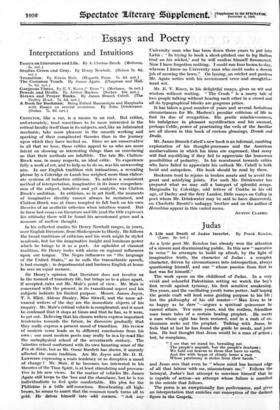Judas
A Life and Death of Judas Iscariot. By Frank Kendon. (Lane. 6s. net.)
As a lyric poet Mr. Kendon has already won the attention of a sincere and discriminating public. In this new " narrative in verse " he attempts to build up afresh, by the light of imaginative truth, the character of Judas : a complex character, driven by circumstances into introspection, always questioning himself, and one " whose passion from first to last was for himself."
The work opens on the childhood of Judas. In a very vivid and colourful Palestinian setting we watch the boy's first revolt against tyranny, his first sensitive awakening. Ten years, and the vacillating youth turns potter, half hoping the gentle craft will lend some guiding purpose to his life ; but the philosophy of his old master—" Man lives to be as happy as he dare "—argues a spiritual quiescence he cannot attain. Ten more years, and the restless, friendless man hears tales of a certain healing prophet.. He meets
a man whose sight has been restored, and in a rush of en. thusiasm seeks out the prophet. Talking with Jesus, he• feels that at last he has found the guide he needs, and joins him. He had thought that Jesus would be a man of. action ;
but, he complains,
" I see that we stand by, bewailing not - The people's anguish, but the people's deafness ; We hold out heaven to those that have no earth, And fire with hopes of cloudy home a race Whose patrimony is stolen from their hands."
and Jesus sees that even he " whose mind has keenest edge of all that labbur with me, misconstrues ma" Follows the betrayal, Judas's last attempt to convince himself that he is capable of action--an attempt whose failure is manifest in the suicide that follows.
The poem is an exceptionally fine performance, and gives
an interpretation that enriches our conception Of the darkest figure in the Gospels.






























































 Previous page
Previous page